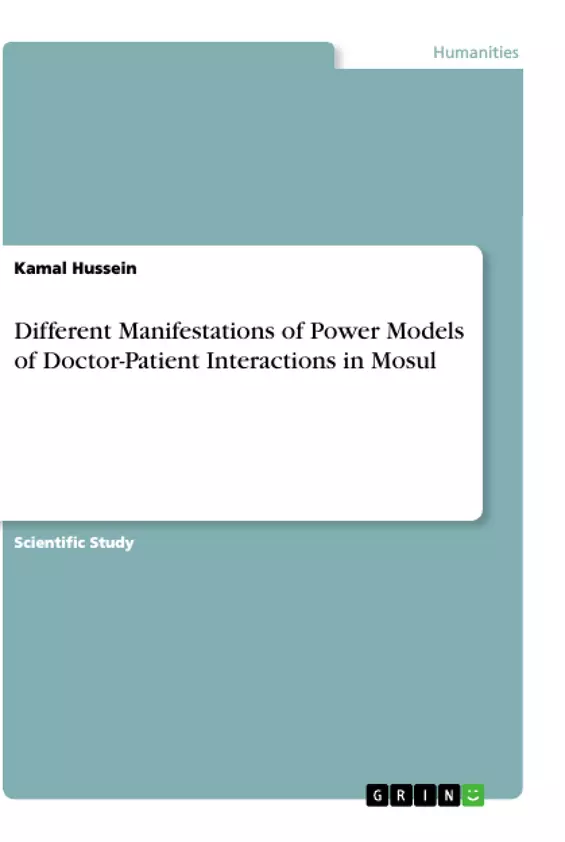This study aims to investigate the notion of power in Mosuli Arabic doctor-patient encounters by establishing the kind of model of interaction adopted in doctor-patient interactions. The theoretical framework adopted in the study is Roter and Hall's typology of models. The naturalistic observation method is the method used to collect data from 10 doctors and 38 patients in different public and private medical settings. The study hypothesizes that doctors adopt a paternalistic model of interaction. The study finds that doctors exercise power when they interact with their patients as that most doctors adopt a paternalistic model of interaction, in which the doctor dominates the medical encounter. More academic research in this area is needed to be able to understand power and its impact on society in general and in medical settings in particular.
Inhaltsverzeichnis (Table of Contents)
- Abstract
- Introduction
- Statement of the problem
- Aim of the study
- Hypothesis
- Power
- Types of Power
- French and Raven's Typology (1959)
- Brody's Typology (1992)
- Language and Power
- Models of Doctor-Patient Interactions
- a. Paternalism
- b. Consumerism
- c. Mutuality
- d. Default
- Methodology
- Data collection method
- Population
- Sampling
- Sample Size
- Method of Analysis
- Findings and Discussion
- Extract 1
- Extract 2
- Extract 3
- Conclusions
- References
- Appendices
Zielsetzung und Themenschwerpunkte (Objectives and Key Themes)
This study focuses on the dynamics of power in doctor-patient encounters within a specific Arabic-speaking context, Mosul. It aims to understand how power manifests in these interactions by analyzing the different models of interaction adopted between doctors and patients. The theoretical framework employed is Roter and Hall's typology of models (2006), which categorizes interactions as paternalistic, consumeristic, mutualistic, and default.
- The nature and dynamics of power in doctor-patient encounters
- The different models of doctor-patient interactions
- The influence of language and power on medical communication
- The impact of different power dynamics on patient health outcomes
- The prevalence of paternalistic models in doctor-patient interactions
Zusammenfassung der Kapitel (Chapter Summaries)
The introduction sets the stage by examining the role of language in establishing social relations, particularly focusing on power dynamics within doctor-patient interactions. It highlights the importance of understanding these dynamics in relation to medical communication and patient health.
The chapter on 'Power' delves into the concept of power, its multifaceted nature, and its importance in various social sciences. It presents different definitions of power and outlines the key contributions of various scholars to the understanding of power dynamics.
The study then elaborates on the different types of power, drawing on typologies by French and Raven (1959) and Brody (1992). It investigates the relationship between language and power, discussing how language can be used to exert and negotiate power in medical settings.
Moving on to the core of the study, the chapter on 'Models of Doctor-Patient Interactions' introduces the framework of Roter and Hall (2006), which defines four models of doctor-patient interactions: paternalistic, consumeristic, mutuality, and default. These models are explored in detail, highlighting the power dynamics inherent in each.
The chapter on 'Methodology' outlines the research methods employed in the study, including the data collection method, population, sampling procedures, sample size, and the method of analysis.
Schlüsselwörter (Keywords)
The key themes of this study revolve around power, doctor-patient interactions, paternalism, mutuality, and consumerism. It explores the dynamics of power and its manifestation in medical contexts, analyzing the role of different models of doctor-patient interactions in shaping these dynamics. The study also delves into the influence of language on power relations, examining the communicative practices that contribute to the establishment and negotiation of power in medical encounters.
Frequently Asked Questions
What is the main finding of the study on doctor-patient interactions in Mosul?
The study finds that most doctors in Mosul adopt a paternalistic model of interaction, where the doctor dominates the medical encounter and exercises significant power.
What are the four models of doctor-patient interaction mentioned?
Based on Roter and Hall's typology, the models are Paternalism, Consumerism, Mutuality, and Default.
Which theoretical frameworks for power are used in the study?
The study references French and Raven's Typology (1959) and Brody's Typology (1992) to categorize types of power.
How was the data for this research collected?
Data was gathered through naturalistic observation of 10 doctors and 38 patients in both public and private medical settings in Mosul.
Why is language important in medical power dynamics?
Language is the tool through which power is exerted and negotiated, significantly impacting patient health outcomes and the doctor-patient relationship.
- Citar trabajo
- Dr. Kamal Hussein (Autor), 2021, Different Manifestations of Power Models of Doctor-Patient Interactions in Mosul, Múnich, GRIN Verlag, https://www.grin.com/document/987345



